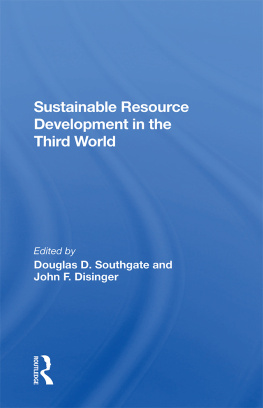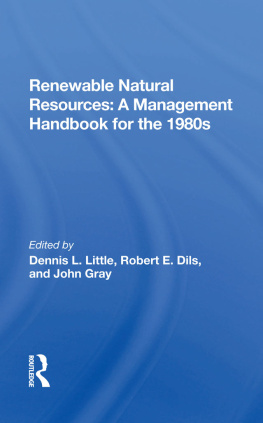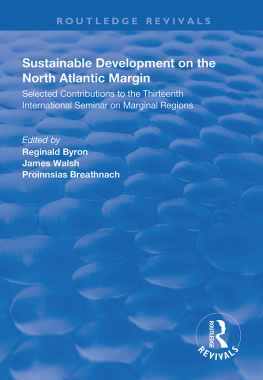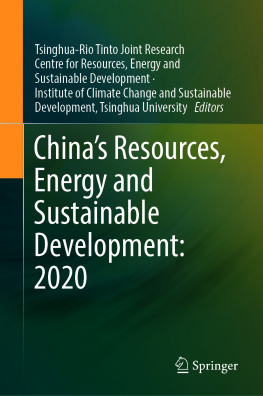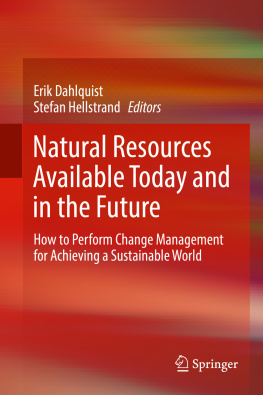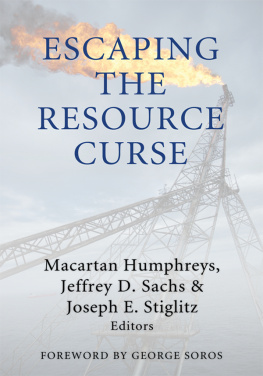Sustainable Resource Development in the Third World
Published in cooperation with the School of Natural Resources of The Ohio State University
Sustainable Resource Development in the Third World
edited by
Douglas D. Southgate
and John F. Disinger
First published 1987 by Westview Press
Published 2019 by Routledge
52 Vanderbilt Avenue, New York, NY 10017
2 Park Square, Milton Park, Abingdon, Oxon OX14 4RN
Routledge is an imprint of the Taylor & Francis Group, an informa business
Copyright 1987 by the School of Natural Resources of The Ohio State University
All rights reserved. No part of this book may be reprinted or reproduced or utilised in any form or by any electronic, mechanical, or other means, now known or hereafter invented, including photocopying and recording, or in any information storage or retrieval system, without permission in writing from the publishers.
Notice:
Product or corporate names may be trademarks or registered trademarks, and are used only for identification and explanation without intent to infringe.
Library of Congress Cataloging-in-Publication Data
Sustainable resource Development in the Third World/
[edited by Douglas D. Southgate and John F. Disinger].
p. cm.(Westview special studies in natural resources and
energy management)
Includes index.
ISBN 0-8133-7522-3
1. Natural resourcesDeveloping countriesManagement.
2. Environmental policyDeveloping countries. I. Southgate,
Douglas Dewitt. II. Disinger. John F. III. Series.
HC59.7.S8826 1987
333.7'15'091724dc19 87-20137
CIP
ISBN 13: 978-0-367-28932-4 (hbk)
Contents
Douglas D. Southgate
Hans Gregersen and Stephen E. McGaughey
Terry J. Logan and Leslie R. Cooperband
Lawrence S. Hamilton and Andrew J. Pearce
Clarence F. Kooi
Douglas D. Southgate and Frederick J. Hitzhusen
David O. Hansen and J. Mark Erbaugh
Richard B. Norgaard
Gary S. Kemph and Abel Hernandez
Robert E. Roth
James R. Barborak and Gina C. Green
Eric L. Hyman
Sunil K. Roy
Special thanks and appreciation for their efforts in the staging of the symposium and the production of this volume are due to the following members of the staff of the School of Natural Resources at The Ohio State University: Craig B, Davis, Director; Judy A. Kauffeld, Editor; Sara Brenner, Janice J. Gorsuch, Marjorie Pless, Elizabeth A. Poeppelman, Jerri L. Shafer, and Mignonne A. Whitlow.
D.D.S.
J.F.D.
Over time, scientists, technologists, and resource managers in affluent countries have devised and institutionalized methodologies for exploiting and managing natural resources in their own environments with considerable success. In doing so, they have provided models, at least of development and affluence, that the less developed countries seek to employ.
Many mechanisms are currently used in the transfer of technology and its concomitants from the developed world to the developing world. Among the most successful are those promoting the open exchange of ideas and information between and among the key players from both worlds.
An international symposium involving both invited and contributed papers addressing the technological and institutional challenges of sustainable development of natural resources in the Third World was staged in September 1985 in Columbus, Ohio, co-sponsored by The Argonne National Laboratory of Argonne, Illinois, The Tropical Renewable Resources Program and the School of Natural Resources of The Ohio State University, and the United States Agency for International Development. This volume presents selected papers from the symposium.
Described in many papers are "success stories"; that is, approaches that have worked are examined. However, the authors have candidly and conscientiously provided complete treatments of their topics, indicating clearly the problems faced, false starts, and frustrations. In doing so, they offer useful suggestions for others to consider in developing their resource management strategies, along with evidence of many options which are better not employed, and many problems still in need of solution.
Douglas D, Southgate
John F. Disinger
Douglas D. Southgate
Throughout the developing world, renewable resources that are the bases for food and energy production are under severe strain. Land quality is deteriorating because of excessive grazing and cropping and because irrigation water is managed poorly. Firewood gathering, increasing agricultural competition for wooded land, and lax enforcement of reforestation laws have combined to create deforestation problems in many third world nations. The impacts of declining land quality, lost forests, and increased sedimentation of waterways are not confined to the countryside. As renewable resources deteriorate, urban residents face progressively higher food prices while paying more for hydroelectricity.
Concerned about the costs of environmental degradation, the governments of many countries have recently initiated projects intended to foster improved resource management or to ease human pressure on the environment. Erosion control has been encouraged on range and farmland upstream from reservoirs. The use of more fuel-efficient stoves has been promoted, where gathering of fuelwood is a primary cause of deforestation. To encourage tree conservation, innovation and adoption of unproved nursery, harvesting, and milling technologies have been supported. Practically all of these initiatives have received financial support from donor agencies.
Some resources management projects have accomplished their objectives. Taken as a whole, however, efforts to conserve renewable resources in the developing world cannot be termed a major success. Even in countries where projects have been undertaken, it is difficult to show that the rates at which agricultural land is degraded, forests are lost, and water is polluted have been greatly reduced.
In part, the limited effectiveness of third world resource conservation projects reflects an inadequate understanding of tropical and subtropical environments. For example, those wishing to mount projects aimed at ameliorating sedimentation problems in reservoirs, waterways, and harbors find their efforts hampered by limited information about how erosion control at one site will affect sediment yield at some point downstream. Beyond such technical limitations, a variety of social and organizational constraints on renewable resource management present themselves in the Third World. In many countries, the primary agents of environmental changesmall farmers and herders confined to marginal landdo not find resource conservation to be in their best interest, given prevailing market and institutional conditions. They are the ones, for instance, who suffer disproportionately from the credit shortages created by interest rate controls which prevail throughout the developing world. Denied access to formal financial markets, they must rely on informal markets, where interest rates are considerably higher. As a result, they are discouraged from investing in land improvement generally, and from adopting soil conservation practices specifically.

